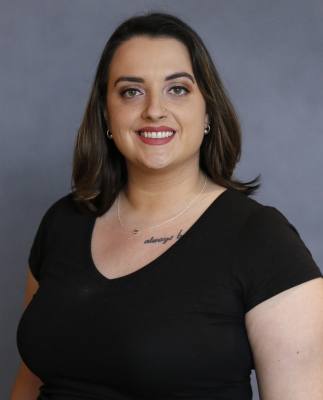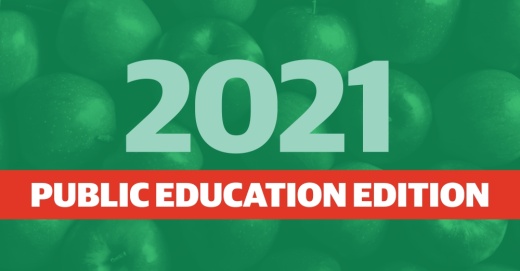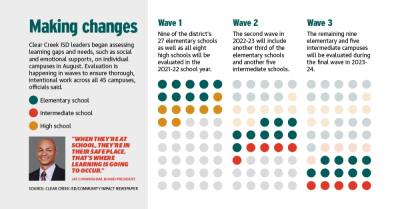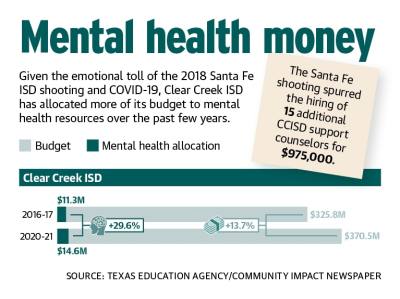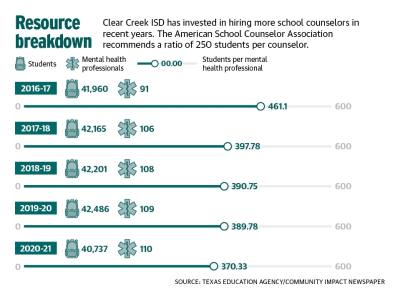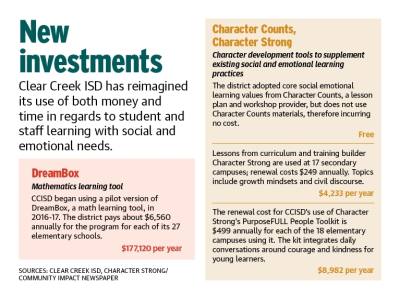This involves giving students the agency to take ownership of their education through the use of technology and customized supports, such as DreamBox, a math program designed to adapt to both elementary students’ answers and problem-solving approach, CCISD officials said.
The philosophy also includes bolstering social and emotional learning, or SEL, which encompasses the processes that help develop the self-awareness, self-control and interpersonal skills necessary to succeed.
“We all wish we had extra time in some subject areas or wish we could fly through the curriculum in others,” said Robert Bayard, CCISD deputy superintendent of curriculum and instruction. “It doesn’t matter what a student’s strengths or weaknesses are—we ... help them to improve based on their individual pathway to learning and, sometimes, [their unique] pace.”
Personalized learning has been a vital aspect of CCISD’s strategic plan since 2013, but even more so given the challenges brought about by the COVID-19 pandemic, officials told Community Impact Newspaper.
Elementary and secondary staff lost out on many personalized learning opportunities amid remote learning environments, Bayard said, but nine elementary schools will be involved in the first wave of campus-by-campus personalized learning support starting this fall.
Learning curve
A broader-than-normal range of proficiency is expected in fall 2021 due to pandemic learning loss, further necessitating personalized learning practices, Superintendent Eric Williams said at a July 12 board workshop. To properly assess the resources needed at each campus, supports are being implemented in waves.
Nine elementary schools will be the focus for 2021-22 with leaders also identifying support needed at the high school level, per CCISD officials. Another nine elementary and five intermediate schools will be the following year, and the remaining nine elementary and five intermediate schools will be targeted in 2023-24.
Personalized learning practices will eventually involve hybrid learning, in which students can balance remote and in-person instruction to suit their needs, Bayard said.
About $7.1 million of the about $36.5 million CCISD is receiving in federal Elementary and Secondary School Emergency Relief funds will be spent on personalized learning-related supports in 2021-22. That includes about $2 million on interventionists, which include retired teachers, teachers performing extra duties or paraprofessionals aspiring to become teachers.
An additional four counselor or social worker positions will also be funded through ESSER for fiscal year 2021-22, per district documents. CCISD has allocated $160,000 per year out of ESSER funds for two social worker positions, according to Alice Benzaia, director of business services and financial planning.
Social and emotional needs
District leaders are focused on reigniting students’ classroom passion and fostering enthusiasm for learning in ways that help boost young learners’ confidence, board President Jay Cunningham said.
“When they’re at school, they’re in their safe place,” he added. “That’s where learning is going to occur."
Personalized learning practices are designed to bolster students’ sense of well-being across all grade levels and help them feel valued, officials said. Part of the conversation around personalized learning involves a uniform understanding of equity, Bayard said.
To him, equity is about meeting the nuanced needs of each student; for example, a gifted and talented student is not necessarily one without need of additional SEL support, nor is that student automatically excelling in every course, Bayard said.
Math learning in kindergarten through eighth grade involves the program DreamBox, which is designed to complement district practices and has lessons that adapt to each student to provide an ideal personalized learning experience, said Susan Silva, CCISD assistant superintendent of teaching and learning, via email.
CCISD has utilized DreamBox in varying degrees for the last five academic years, first purchasing a pilot version for select grades in 2016-17. The district now pays about $177,120 annually for the program for all of its 27 elementary schools.
The program’s dashboard provides teachers with several types of reports, so they always know how their students are performing, how DreamBox is helping and if students have other needs, Silva said.
During the 2020-21 school year, almost 60% of kindergarten students were able to work above grade level in DreamBox, and more than 40% of first- and second-graders were working above grade level in 2020-21, according to Silva.
Deepening staff knowledge
Personalized education philosophies also extend to staff: The district uses the term “professional learning” over professional development to emphasize the importance of educators setting their own goals and forming collaborative circles, Bayard said.
Professional learning for teachers includes professional learning communities, where teachers of similar content can collaborate to analyze data, determine student strengths and weaknesses and adjust along the way based on student performance, Bayard said.
“We’re really focusing on response to intervention ... and the best first-time instruction,” he said.
“Some students might need a different approach, and that’s what this is all about.”
This includes deepening staff knowledge of SEL: legislation passed during the 87th Texas Legislature requires staff training on how grief and trauma affects student learning, Bayard said. CCISD has been providing trauma-sensitive instruction for educators for several years, so the legislation passed is in line with district personalized learning concepts.
All training helps staff develop a sensitivity to student triggers and how they may react if emotionally disturbed, he said, adding that acknowledging trauma helps educators meet students’ individual needs.
Post-secondary success
As counselors have helped students work through new challenges, they noticed trends such as anxiety, said Dava West, CCISD’s director of guidance and counseling. However, this does not mean students are not thinking about the future.
“While working with students, CCISD counselors have noticed that students are feeling a connection to their families, focused on resiliency and are hopeful for their future,” she said in an email.
Developing personalized learning supports helps ensure students do not feel overwhelmed or underwhelmed by the pace of their classwork, Bayard said. This development also helps prevent students from progressing through coursework if they are not ready by using instructional tools to fill learning gaps.
CCISD is not the first Texas district to try a personalized approach to learning. Dallas ISD, which serves about 145,000 students, has a personalized learning toolbox that has given students several options and allowed them to set their own pace for their instruction, DISD students said in a video produced by the district.
Personalized learning aims to set students up for lifelong success by incorporating technologies that allow them to self-explore, CCISD staff said. Cunningham said gifted and talented students learning via contemporary technology can often find critical shortcuts to tasks because they are so tech savvy and have been given chances to explore.
“We want our students to be able to set goals for themselves and for students to go into jobs feeling confident and competent in [their] skills, ... and that’s what this does,” Bayard said.


